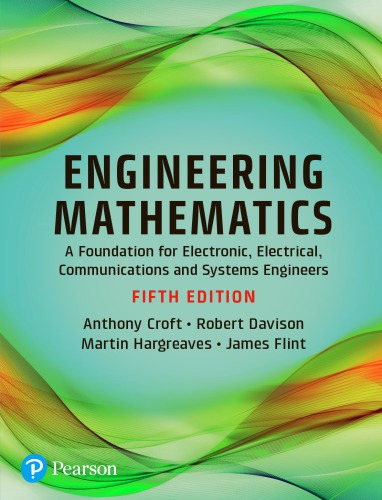

Most ebook files are in PDF format, so you can easily read them using various software such as Foxit Reader or directly on the Google Chrome browser.
Some ebook files are released by publishers in other formats such as .awz, .mobi, .epub, .fb2, etc. You may need to install specific software to read these formats on mobile/PC, such as Calibre.
Please read the tutorial at this link: https://ebookbell.com/faq
We offer FREE conversion to the popular formats you request; however, this may take some time. Therefore, right after payment, please email us, and we will try to provide the service as quickly as possible.
For some exceptional file formats or broken links (if any), please refrain from opening any disputes. Instead, email us first, and we will try to assist within a maximum of 6 hours.
EbookBell Team

4.1
80 reviews
ISBN 10: 1292146656
ISBN 13: 9781292146652
Author: Tony Croft, Robert Davison, James Flint, Hargreaves
At Pearson, we have a simple mission: to help people make more of their lives through learning. We combine innovative learning technology with trusted content and educational expertise to provide engaging and effective learning experiences that serve people wherever and whenever they are learning. From classroom to boardroom, our curriculum materials, digital learning tools and testing programmes help to educate millions of people worldwide – more than any other private enterprise. Every day our work helps learning flourish, and wherever learning flourishes, so do people.
1.1 Introduction
1.2 Laws of indices
1.3 Number bases
1.4 Polynomial equations
1.5 Algebraic fractions
1.6 Solution of inequalities
1.7 Partial fractions
1.8 Summation notation
Review exercises 1
2.1 Introduction
2.2 Numbers and intervals
2.3 Basic concepts of functions
2.4 Common engineering functions and techniques
Review exercises 2
3.1 Introduction
3.3 The trigonometric ratios
3.4 Sine, cosine and tangent functions
3.5 The sinc x function
3.6 Trigonometric identities
3.7 Modelling waves using sin t & cos t
3.8 Trigonometric equations
Review exercises 3
4.2 Cartesian coordinates – 2D
4.3 Cartesian coordinates – 3D
4.4 Polar coordinates
4.5 Simple polar curves
4.6 Cylindrical polar coordinates
4.7 Spherical polar coordinates
Review exercises 4
5.2 Set theory
5.3 Logic
5.4 Boolean algebra
Review exercises 5
6.1 Introduction
6.2 Sequences
6.3 Series
6.4 The binomial theorem
6.5 Power series
6.6 Iterative sequences for solving nonlinear equations
Review exercises 6
7.2 Vectors and scalars
7.3 Cartesian components
7.4 Scalar & vector fields
7.5 Scalar product
7.6 Vector product
7.7 Vectors in n dimensions
Review exercises 7
8.1 Introduction
8.2 Basic definitions
8.3 Matrix operations
8.4 Transformations of vectors
8.5 Special matrices
8.6 Inverse of a 2×2 matrix
8.7 Determinants
8.8 Inverse of a 3×3 matrix
8.9 Solving simultaneous equations
8.10 Gaussian elimination
8.11 Eigenvalues & eigenvectors
8.12 Electrical network analysis
8.13 Iterative techniques
8.14 Computer matrix solutions
Review exercises 8
9.1 Introduction
9.2 Complex numbers
9.3 Complex operations
9.4 Graphical representation
9.5 Polar form
9.6 Vectors & complex numbers
9.7 Exponential form
9.8 Phasors
9.9 De Moivre’s theorem
9.10 Loci in the complex plane
Review exercises 9
ka stroud engineering mathematics
bs grewal engineering mathematics
bv ramana higher engineering mathematics
engineering mathematics and statistics
engineering mathematics and statistics berkeley
Tags: Tony Croft, Robert Davison, James Flint, Hargreaves, mathematics, electronic